Dr. Srinivasa Reddy has more than 20 years of research experience in the synthesis of natural products/medicinal chemistry/drug discovery. Dr. Reddy is best known for his application oriented organic synthesis towards human wellbeing. He is also known for the application of “Silicon-switch approach” in medicinal chemistry. In addition, the work carried out by his group on crop protection is worth highlighting. He is an author of ~120 publications and an inventor in ~35 patents.
1. 20 + Years of research experience (post-PhD) in total synthesis of natural products/medicinal chemistry/drug discovery
2. Experienced in leading drug discovery programs (7 years of pharma industry experience).
3. One of the molecules (Licogliflozin) discovered by his team in industry is currently in human clinical trials (Phase-II), where he was a project leader.
4. Out-licensed patent/technology (two nos.) developed by team at CSIR-NCL.
5. Has experience in coordinating multi-disciplinary teams as a project leader, in particular, during the tenure at pharma industry.
6. Acquired skills in designing novel small molecules and lead optimization.
7. Experienced in planning and execution of projects (Govt. and Industry).
8. Accomplished total synthesis of several natural products (>50 nos) and many of them are for the first time.
9. Identified Silinezolid with high brain:plasma ratio with a potential to treat brain infections.
10. Identified novel mosquito repellents – further work is in progress.
11. Developed a method to access enantiopure pheromones towards crop protection.
12. Identified novel Cladologs towards potent anti-malarials.
13. Identified a few early leads towards developing drugs for treating infectious diseases and metabolic disorders.
Dr. Reddy received several recognitions including the prestigious Shanti Swarup Bhatnagar Award (SSB) in Chemical Sciences and J. C. Bose National Fellowship by DST-SERB, Govt of India.
CSIR-Indian Institute of Chemical Technology has been striving towards the welfare of the society through chemistry and chemical technologies since its inception in 1944. In its journey of close to eight decades, the institute has developed and transferred technologies in the areas of Coal, Oils & Fats, Generic Drugs, Agrochemicals, Catalysis, Polymers and Coatings.The institute was established with an objective to serve the society of the region through scientific inventions. Over the period of time, IICT has transformed into an institute of international repute and addresses several global issues. Today, our institute has a rich pool of highly qualified scientific personnel and vibrant research students who are involved in diverse areas of research and innovation related to chemical sciences and technology. The Government of India has taken up many initiatives towards achieving “Atmanirbhar Bharat” and our institute is actively involved in many S & T programs in line with this. We have the state-of-the-art infrastructure to undertake industrial projects in a “concept to commercialization” mode. The analytical facilities not only cater to the needs of the in-house projects but also support the industries and MSMEs in particular. The Mol Bank, a unique facility available in the institute, is the repository of molecules prepared by the chemists from various parts of the country and these molecules are regularly screened for biological activity. The recently established Kilo Lab Facilities are open for in-house and MSMEs to produce KSMs and APIs and also agro-chemicals of export quality under stringent quality parameters.
Hyderabad is the epicenter of pharmaceutical industry and a new Pharma City is being established near Hyderabad and our institute is geared up to meet the requirements of this industry. As a part of Skill India Program, we have initiated many courses to enhance skill sets and hence employability of young researchers. We also undertake special residential skill development programs for students from North Eastern States every year sponsored by Corporate Social Responsibility (CSR) grants. "We aim to develop public private partnerships to enhance our contributions towards human well-being"
Director
+91-40-27193030
director@iict.res.in
To Serve society by creating an outstanding knowledge base in chemistry and chemical technology
CSIR-IICT will strive towards knowledge intensive translational research in chemistry to meet the country’s expectations with novel technologies.
History
The CSIR-Indian Institute of Chemical Technology (CSIR-IICT) is one of the oldest National Laboratories under the Council of Scientific & Industrial Research (CSIR). It started as the Central Laboratories for Scientific & Industrial Research (CLSIR) by the then princely State of Hyderabad in 1944. CSIR-IICT during its seventy year journey has made its mark as a dynamic, innovative and result oriented R&D organization. The clientele spans all comers of the globe. In India it is the reliable destination of chemical and biotech industries. The reputation that CSIR-IICT could establish amongst the industrial clients as a reliable R&D partner, can be largely attributed to its rich pool of scientists with expertise in broad ranging research areas and simple and effective business development strategies.
The Transformation from CLSIR to CSIR-IICT
For a laboratory with Global presence, it had a humble beginning when the princely state of Hyderabad was planning to create a research Centre. A first step in the direction of creating applied research appears to have been taken by Hyderabad State when the Industrial Laboratory was set up by the then Government in 1920s which became the forerunner of CLSIR. Its work involved scientific help & advice, analytical services, and investigations & research on industrial problems. The areas of investigation on laboratory scale in 1940s, for example, included: synthesis of known drugs; organic acids from vegable wastes; denaturants for alcohol used as motor spirit; graphite and mica purification; fire-proof enamels and glass for bangles; and examination of fibers. Similar laboratories were later set up in some British provinces.
The formative Years:
In 1940, the Imperial India constituted the Board of Scientific & Industrial Research (BSIR) to facilitate industrial research. On the suggestion of the Government of India, a BSIR was also established in Hyderabad in 1942. The CSIR came into existence in 1942 as an autonomous body registered under the Societies Act. With the creation of CSIR in New Delhi, the Government of India requested the British Government for expert advice on the organization of scientific research in India.
Accordingly, Professor AV Hill, Secretary of the Royal Society, London visited India in 1943 and interacted with officials concerned and identified Hyderabad as the location for establishing an Industrial research laboratory. Hyderabad being particularly rich in raw materials, especially vegetable oils, coal, various types of clays On the suggestion of the Government of India, a BSIR was also established in Hyderabad in 1942 and two years later CLSIR was created to carry out similar functions in Hyderabad State. By the Firman dated August 5,1944, the Nizam directed the Government to set up the CLSIR at Hyderabad and the appointment of Dr. Muzzaffaruddin Qureshi as its first Director.The Government Industrial Laboratory, Hyderabad, which had been functioning for over two decades, was merged with CLSIR. The Hyderabad BSIR too became a part of CLSIR. After Independence, the state of Hyderabad has merged with Independent India, and CLSIR started working closely with CSIR. A pioneering effort to promote research and provide assistance to small industries was made by the Hyderabad Government through the creation of and Industrial Trust Fund. Many of the large pilot plants set up by the CLSIR were financed by the Fund.
Dr. S Hussain Zaheer was appointed as Director of CLSIR on November 28,1948. On taking over the charge, Dr. Zaheer reoriented the Institutes research focus on Oils & Fats; Coal & Fuels; Heavy Chemicals and Fertilizers; Ceramics; Organic Chemistry, Pharmaceuticals and Drugs; Biochemistry; Physical Chemistry; Chemical Engineering and Operations Research.
Regional Research Laboratory, Hyderabad (RRL-H):
CLSIR was formally taken over by the CSIR on April 13,1956 and was renamed the Regional Research Laboratory, Hyderabad. RRL-H has the distinction of becoming the first Regional Research Laboratory to be set up by CSIR. In 1950s through eighties, RRL-H assumed national importance as leading organization in Chemical Sciences and Technology in several areas like coal, oils & fats, paints ceramics, paper, drugs etc. Dr. Hussain Zaheer was appointed as Director General, CSIR in 1964 and Dr. GS Sidhu succeeded him as the Director of RRL-Hyderabad. A major event which brought about structural changes in the Laboratory was the establishment of semi-autonomous "Centre for Cellular and Molecular Biology (CCMB)" on April 1,1977. The Biochemistry Division of RRL-H formed the nucleus of CCMB and Dr. PM Bhargava as its Head. After being at the helm of affairs for close to two decades as Director RRL, Dr. Sidhu was appointed as Director General CSIR on May 5,1981. Dr. G Thyagarajan took over as Director of RRL-H on February 2,1981. On the request of CSIR, Dr. Thyagarajan moved to CLRI, Madras as Director. Dr. AV Rama Rao was appointed as Director RRL-H on July 15, 1985. With a view to bring in cohesion to the R&D activities of RRL-H, the laboratory was reorganized into major divisions and supporting infrastructural groups to cater the emerging needs.
Indian Institute of Chemical Technology (IICT):
The Prime Minister in his capacity as the President of the CSIR, appointer a committee headed by Shri Abid Hussain in April 1986 to review the functions and structure of CSIR. The Committee submitted its Report on December 31,1986. One of the recommendations was to reorganize the RRLs to reflect the direction and orientation of the expertise and excellence developed by them. The RRL was rechristened as the Indian Institute of Chemical Technology with effect from April 1,1989. IICT celebrated its Golden Jubilee in 1994. A monument erected to commemorate IICTs 50 years of fruitful existence was unveiled by the Governor of AP Shri Krishan Kant on August 6,1994. Shri P V Narasimha Rao, Prime Minister of India graced the Golden Jubilee Function of IICT and inaugurated the Golden Jubilee Block comprising Discovery Laboratory, Natural Products Laboratory and Catalysis Laboratory. Dr. KV Raghavan was appointed as Director of IICT on January 11,1996. Dr. Raghavan strengthened the chemical process development and design, reaction engineering groups of IICT. Dr. JS Yadav took over as Director of IICT on October 1,2003. CSIR-IICT celebrated its Diamond Jubilee in August 2004. During the early part of the new millennium, IICT had redrawn its vision with an aim to emerge as an innovative global R&D organization in the field of chemical sciences & technology. To this end, three National Centres viz. Lipid Research, Semiochemicals and Chemical Biology were created.
CSIR-Indian Institute of Chemical Technology (CSIR-IICT):
CSIR in its bid to ensure better recognition and visibility, had decided to add the suffix "CSIR" to all labs during 2010-11. Subsequently, IICT is now referred as CSIR-IICT. Dr. Ahmed Kamal took over as Acting Director after the retirement of Dr. J.S. Yadav in August 2012. In a major landmark appointment, Dr. M Lakshmi Kantam became the first woman Director of a CSIR lab in the entire seven decade long history of CSIR, when she took over as Director of CSIR-IICT on April 9, 2013. With the present focus on developing green processes relevant to the Industry, several technology transfers are in the pipeline. CSIR-IICT is celebrating the Seven Decade Service to the Nation in August 2014.
CSIR-IICT during its seventy year journey has made its mark as a dynamic, innovative and result oriented R&D organization. The clientele spans all comers of the globe. In India it is CSIR-Indian Institute of Chemical Technology (CSIR-IICT) is one of the oldest National Laboratories the reliable destination of chemical and biotech industries. The reputation that CSIR-IICT could establish amongst the industrial clients as a reliable R&D partner, can be largely attributed to its rich pool of scientists with expertise in broad ranging research areas and simple and effective business development strategies.
The Council of Scientific & Industrial Research (CSIR), known for its cutting edge R&D knowledge base in diverse S&T areas, is a contemporary R&D organization. CSIR has a dynamic network of 37 national laboratories, 39 outreach centres, 1 Innovation Complexes, and three units with a pan-India presence.
CSIR’s R&D expertise and experience are embodied in about 3521active Scientists supported by about 4162 technical and support personnel as of 31st March 2022.
CSIR covers a wide spectrum of science and technology – from oceanography, geophysics, chemicals, drugs, genomics, biotechnology and nanotechnology to mining, aeronautics, instrumentation, environmental engineering and information technology. It provides significant technological intervention in many areas concerning societal efforts, which include environment, health, drinking water, food, housing, energy, farm and non-farm sectors. Further, CSIR’s role in S&T human resource development is noteworthy.
Pioneer of India’s intellectual property movement, CSIR today is strengthening its patent portfolio to carve out global niches for the country in select technology domains. CSIR filed about 229 Indian patents and 202 foreign patents during 2021-22. CSIR has a patent portfolio of 1,132 unique patents in force, out of which 140 patents have been commercialized. CSIR also has 2,587 in force patents granted abroad in multiple countries. Amongst its peers in publicly funded research organizations globally, CSIR is a leader in filing and securing patents worldwide.
CSIR has pursued cutting edge science and advanced knowledge frontiers. In 2021, CSIR published around 5769 papers in SCI Journals with an average impact factor per paper of 5.401.
CSIR has operationalized desired mechanisms to boost entrepreneurship, which could lead to enhanced creation and commercialization of radical and disruptive innovations, underpinning the development of new economic sectors.
CSIR envisages a vision of CSIR@2030 as to “Enhance quality of life of the citizens of India through innovative Science and Technology, globally competitive R&D, by developing sustainable solutions and capacity building to fulfil dream of Atmanirbhar Bharat”. This vision of CSIR is aligned to the Government of India’s vision for the next 25 years ‘Amrit Kal’ when independent India becomes 100 years old.
CSIR is ranked 37th among 1587 government institutions worldwide and is the only Indian organization among the top 100 global government institutions, according to the Scimago Institutions Ranking World Report 2021. CSIR holds the 7th rank in Asia and leads the country at the first position.
Source From https://csir.res.in
1. Partner the industry to develop cost efficient processes / technologies and materials, which are relevant to the industry
2. Provide value added services, by way of Analytical and Consultancy services
3. Support entrepreneurship in niche and upcoming areas by creating echo-system to support start-ups, incubations and spin-offs.
4. Generate revenues from above to keep pace with self-sustenance goal of CSIR.
5. Utilize public funds for enhancing the expertise in niche areas
IICT Research Foundation (IRF) is a trust situated at Office of the Director, Indian Institute of Chemical Technology, Uppal Road, Tarnaka, Hyderabad and has been constituted mainly to propagate research talent and education generally. The key feature of the trust is to impart scientific education and development of science for the welfare of the mankind. Some of the aims and objectives of the Trust shall be any or all of the following:
The advancement of excellence in Science and Technology
1. To create a forum for interaction of scientific community with science teachers
2. To conduct seminars, Lectures / exhibitions to propagate scientific achievements
3. To develop scientific temperament amongst the children and attract them towards science education.
4. To improve the standards of science teaching at high school and university level by conducting training classes and seminars.
5. To promote professional, technical and vocational education.
6. To identify and adopt meritorious children from weaker financial strata and provide financial support for their education.
7. To provide financial support for establishment of good science labs by giving equipment and materials to the schools.
8. Institution of Awards/Lectures
9. To award the best Ph.D students for excellent basic or applied scientific contribution of the year and for the best Ph.D thesis., To award scientific/technical staff of IICT for world class innovation development.
10. Rural Development
11. To educate farmers in pest management and to assist in rural and community development.
12. To develop projects for adoption in villages for social economic and community development. To educate and train the farmers in cultivation of medicinal plants and also other agricultural products by good science practices.
To promote extracurricular activities such as sports events, science quiz, general knowledge, science exhibitions/fairs, or competitions etc among staff, children of staff members, research scholars and school children.
Nearest airport is the Rajiv Gandhi International Airport, Hyderabad. Ditance 40KM from the CSIR-IICT.
CAB and Bus facilities is available to reach IICT.
Nearest railway Staions are:
1. Secundrabad Railway station (5KM)
2. Hyderabad Railway station (15KM)
3. Kachiguda Railway station (11KM)
Metro, CAB, BUS, Auto Facilities are available to reach IICT.
Nearest Bus stations are Jublee Bus Stand Secundrabad and Mahatma Gandhi Bus Stand Hyderabad.
Metro, Local Buses, CAB, Auto Facilities are available to reach IICT.
Nearest Metro Station is Habsiguda Netro station. 500 meters far from IICT Campus.
Nearest local Bus station are Tarnaka, Habsiguda runs number of busses from the all parts of the city.
Guest House Incharge, CSIR-Indian Institute of Chemical Technology, Uppal Road, Tarnaka, Hyderabad, zip-code: 500007, Telangana State, India. Telephone: Email: Office Hours: 09 AM to 05:30 IST
Being the headquarter of South Central Railway; Hyderabad is well connected with all major cities of India like Delhi, Mumbai, Chennai, Visakhapatnam, Bengaluru, Kochi, Kolkata. There are railway stations at Nampally and Kachiguda. Trains leaving from these two stations can also be boarded at Secunderabad railway station.
Regular services of state roadways and privately owned buses from the bus stand of the city are available. Roads are well linked with important cities and states. You can also hire rented cars or taxis to your desired destination.
On this Day, I solemnly affirm that I will rededicate myself to the cause of safety, health, and protection of the environment, will do my best to observe rules, regulations, procedures and develop attitudes and habits conducive for achieving these objectives.
I fully realise that accidents and occupational diseases are a drain on the national economy and may lead to disablements deaths, harm to health, damage to property, social suffering, and general degradation of the environment.
I will do everything possible for the prevention of accidents, occupational diseases, and protection of the environment in the interest of self, family, organization, community, and the nation at large.
1. Good ventilation in place of work
2. Fire extinguisher in workplace vicinity
3. Safety shower and eyewash near the workplace
4. All chemicals/equipment/ instruments are labelled.
5. Chemicals away from the source of fire
6. Fume cupboards are used for chemical reactions
7. Inform authorities about your working at odd hours
8. Secured compressed gas cylinders and clear labels
9. Leak detectors for poisonous; cases
10. Careful handling of chemical glassware
1. Leaving experiments unattended
2. Smoking at workplace
3. Work alone odd hours (nights)
4. Disposing of hazardous chemicals and solvents in sinks
5. Store chemicals in unauthorized places
1. Safety culture amongst your colleagues.
2. Communications to superiors about your hazardous process work
3. Preparation of hazardous operation procedures
1. Free escape routes during emergencies.
2. Telephone numbers of safety persons
3. Chemical Safety Data Sheets
1. Pull the fire alarm immediately.
2. Alert the fire station and medical staff & Inform the Safety Cell In-charge. Commission the fire extinguisher located in the immediate vicinity. Try to provide help to those trapped.
3. Make a preliminary investigation before help arrives.
Dr. D Srinivasa Reddy
Director
+91-40-27193030
director@iict.res.in
Sri. M. Ananda Kumar
Controller of Administration (COA)
91-040-27193719
coa@iict.res.in
Sri. Suman Kanti Roy
Controller of Finance & Accounts (COFA)
+91-40- 27193182
skroycofa@iict.res.in
Sri. Sudhanshu Shekhar Choudhary
Controller of Stores and Purchase (COSP)
+91-40-27191246 | +91-40-27193461
sschoudhary@iict.res.in
Sri. Dharmendra Kumar
Controller of Stores and Purchase (COSP)
+91-40-27191243 | +91-40-27193111
spodk@iict.res.in
Dr. D. Shailaja
Chief Scientist & Chair
Business Development and Research Management (BDRM)
+91-40-27193992
sdonempudi@iict.res.in
Dr. K. Rajender Reddy
Chief Scientist & Chair
Knowledge and Information Management
+91-40- 27191710
rajender@iict.res.in
Dr. L. Giribabu
Sr. Principal Scientist & Chair
Academic Affairs Unit (AAU)
+91-40-21791623
aau@iict.res.in
E-mail2: aau.iict@gov.in
Dr. Sistla Ramakrishna
Chief Scientist & Chair
Applied Biology Department
+91-040-27193753
sistla@iict.res.in
Dr. S Prabhakar
Chief Scientist & Chair
Department of Analytical and Structural Chemistry
+91-40-27191342
prabhakar@iict.res.in
Dr. N. Lingaiah
Chief Scientist & Chair
Department of Catalysis and Fine Chemicals
+91-40-27191722
nakkalingaiah@iict.res.in
Dr. Pradosh P. Chakrabarti
Chief Scientist & Head
Dept. of Oils, Lipid Science & Technology
+-91-40-27191834
pradosh@iict.res.in
Dr. B. Chinna Raju
Sr. Principal Scientist & Chair
Dept. of Natural Products & Medicinal Chemistry
+91-40- 27191725
chinaraju@iict.res.in
Dr A Gangagni Rao
Chief Scientist & Chair
Dept. of Energy & Environmental Engg.
91-40-27191807
agrao@iict.res.in
Dr. A. Krishnaiah
Chief Scientist & Chair
Fluoro-Agrochemicals
91-040- 27193138
krishnu@iict.res.in
Dr. Raji Reddy Ch
Chief Scientist & Chair
Department of Organic Synthesis & Process Chemistry
+91-40-27191885
rajireddy@iict.res.in
Dr. Rohit Kumar Rana
Chief Scientist & Chair
Polymers & Functional Materials Division
+91-40-27191515
rkrana@iict.res.in
Dr.Satyavathi B
Chief Scientist & Chair
Process Engineering & Technology Transfer
+91-040-27191331
satya@iict.res.in
Sri. G.A. Raju
Chief Scientist
Centre for IT Services
+91-40-27193310
iict-cits@iict.res.in
Dr. Varsha Rajkumar Ohatker
Medical Officer & Incharge
Dispensary
+91-40-27193961 / +91-40-27191683
varsha@iict.res.in
Sri. Ch. Srinivas
Sr. Superintending Engineer & Incharge
Engineering Services Division (ESD)
+91-040-27193130
schilagani@iict.res.in
Dr. H. S. Simha
Chief Scientist & Chair
Guest House & Canteen
+91-40-27191255
simha@iict.res.in
Dr. Debendra Kumar Mohapatra
Chief Scientist & Chair
Safety Cell
+91-40-27193128
mohapatra@iict.res.in
Biennial Report 2016-18-2018- View PDF File(35.88 MB)
Biennial Report 2018-20-2020- View PDF File(15.82 MB)
Biennial Report-2022- View PDF File(53.73 MB)
R&D Facility Book - View PDF File (26.4 MB)
IICT Brochure - View PDF File (1.48 MB)
IICT 75 Years IICT Platinum Jubilee - View PDF File (178 MB)
IICT 70 Years - View PDF File (15.29 MB)
IICT 50 Eventful Years By Bharat Bhushan - View PDF File (15.29 MB)
Spandan-2014-2015 - View PDF File (52.64 MB)
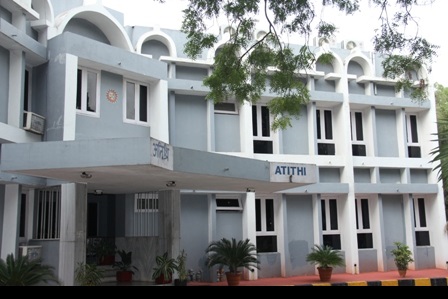
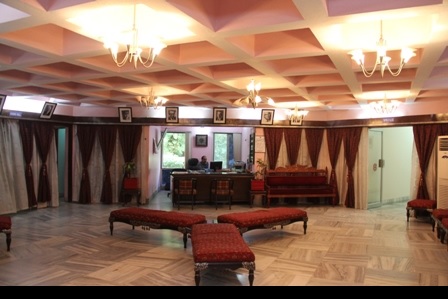
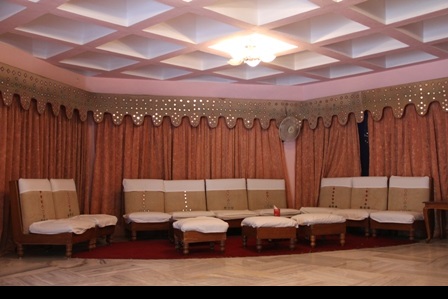

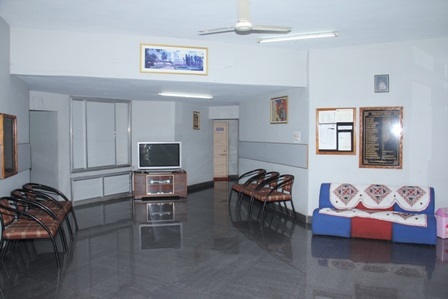
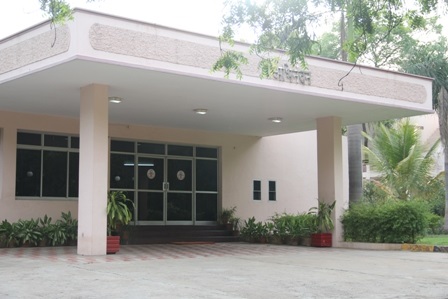
Guest House Section
CSIR-Indian Institute of Chemical Technology
A Constituent Laboratory of the Council of Scientific and Industrial Research [CSIR]
MINISTRY OF SCIENCE & TECHNOLOGY, GOVERNMENT OF INDIA
TARNAKA, HYDERABAD- 500007, TELANGANA, INDIA